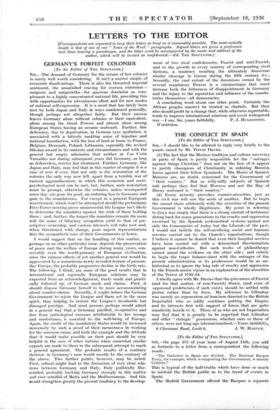GERMANY'S FORFEIT COLONIES
LETTERS TO THE EDITOR
[Correspondents are requested to keep their letters as brief as is reasonably-possible. The most. suitable length is that of one of our News of the Week" paragraphs. Rigned.letters.are given a preference over those bearing a pseudonym, and the latter must be accompanied by the name and address of the author, which will be treated as confidential.—Ed. THE "SeecrAmit.i [To the Editor of TIIE SPECTATOR.] SIR,—The demand of Germany for the return of her colonies is surely well worth considering. It isn't a matter simply of
economic disadvantage. There is also the thwarted imperial sentiment, the unsatisfied craving for oversea extension— outposts and outgrowths—for spacious dominion as com-
plement to a highly concentrated national life, providing this with opportunities for adventurous effort and for new modes of national self-expression. It is. a need that has lately been met by both Japan and Italy in ways condemned generally, though perhaps not altogether fairly. But their success leaves Germany alone without colonies or their equivalent, alone among the Great Powers and almost alone among European States having an oceanic seaboard. Further, this deficiency, due to deprivation, in German eyes spoliation, is associated with a bitterly rankling sense of injustice. and national humiliation, with the loss of land at home to France, Belgium, Denmark, Poland, Lithuania, especially the revised Silesian award in its contents and circumstances and with the general but empty admission that neither at Vae Vietis Versailles nor during subsequent years did Germany, as long as defenceless, receive fair treatment. Further, Germany, like Japan and Italy, may feel that in this matter of empire it is a case of now if ever, that not only is the restoration of the colonies the only way now left, apart from a terrible war of eastern aggrandisement, in which this economic and socio- psychological need can be met, but, further, such restoration must be prompt, otherwise the colonies, unless reconquered some day, are gone for good, an enduring loss to Germany and gain to the mandatories. _ For except in a general European resettlement, which won't be attempted should the preliminary Five-Power meeting prove unsuccessful, the League isn't likely to determine the mandates against the wish of those holding them ; and, further, the longer the mandates remain the more will the sense of fiduciary occupation yield to that of pre- scriptive ownership, and various interests will take root and, when threatened with change, pour urgent representations into the sympathetic ears of their Governments at home.
I would suggest that on the handling of this matter, as perhaps on no other particular issue, depends the preservation of peace and the welfare of Europe during many years, con- ceivably . even the world-primacy of European civilisation, since the ruinous effects_ of yet another, general war would be aggravated by a momentous newly revealed feature of present- day Europe, the probably progressive decline in the birth-rate. The following, r think, are. some of the good results that in international and especially ,European relations may be expected- from an acknowledgement freely made and practi- cally followed- up, of German needs and etariris. First, it should dispose Germany herself to be more accommodating about counter-claims. Secondly, it might induce the German Government to -rejoin the League and there act- in the same spirit, thus -helping to restore the League's invaluable but damaged 'prestige. And most persons perhaps would adinit in a general *-as, that ,a Germany pacified, co-operatiVe and free from pathological excesses attributable to her wrongs and misfortunes, is essential .to the well-being of Europe. Again, the credit of the mandatory StateS would be increased immensely by such' a proof of their earnestness in working for the common cause, and both the example and the attitude that it would make' possible on their part' shoidd be very helpful in the case of other' nations when somewhat similar appeals are made to them in the subsequent attempt to reach a general agreement. The probable results of a contrary decision in Germany's case would mostly be the contrary' of the above. Two - further points," however, may be noted. First, refusal might lead to the formation of very' close rela- tions between Germany and Italy, Italy' pOlitictally like- minded, Probably -backing. Germany strongly in this matter and ever mindful of Malta and the Mbditertrineari.
would strengthen greatly the present-tendency to thellevelop- ment of two rival confederacies, Fascist and anti-Fascist, and to the growth in every country of . corresponding rival factions, a tendency recalling the ultimately . disastrous similar cleavage in Greece during the fifth century n.c., Secondly, the vast extent of the dominions owned by the several mandatory Powers is a, circumstance that must increase froth the bitterness Of disappointment in Germany and the injury to the reputation and influence of the manda- tories themselves—all democracies.
A concluding word about one other point. Certainly the African peoples mustn't be treated as chattels. But they also should profit by a change that, while otherwise regrettable, tends to improve international relations and avert widespread
war.—I am, Sir, yours faithfully, P. J. HUGHESDON. IV itubledon.










































 Previous page
Previous page